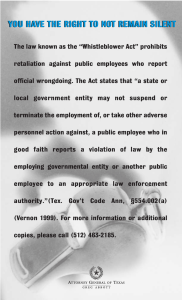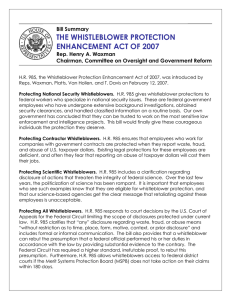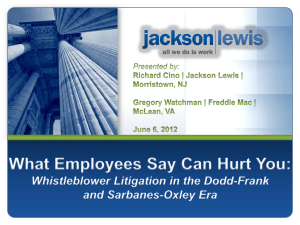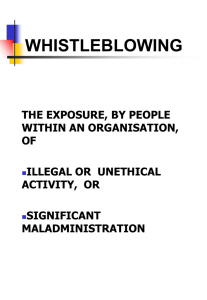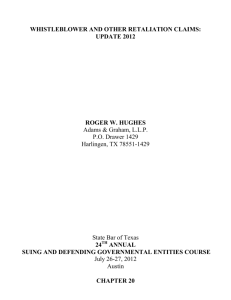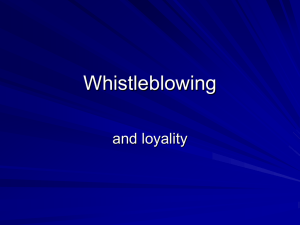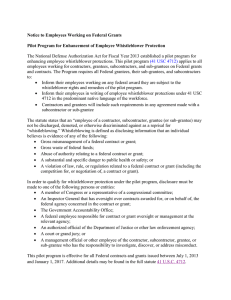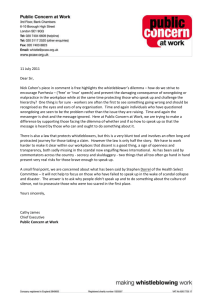BÁO CÁO KẾT QUẢ THU THẬP VÀ PHÂN TÍCH Ý KIẾN ĐÓNG GÓP
advertisement
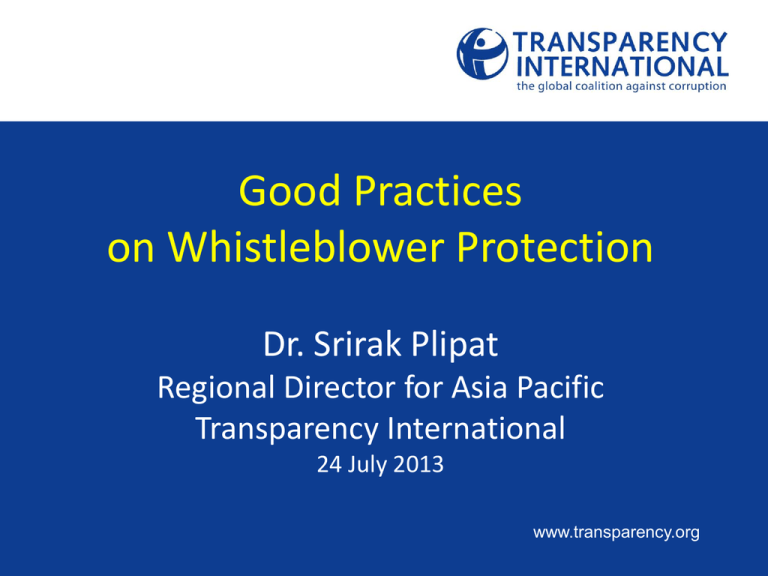
Good Practices on Whistleblower Protection Dr. Srirak Plipat Regional Director for Asia Pacific Transparency International 24 July 2013 www.transparency.org November 2010 TI Strategy 2015 1 The Good Practices 1. Principles underlining good practices 2. Challenges to Good practices: findings from country report analysis 3. One example of good practice Recent development • 2010 TI launched a position paper on whistleblower protection • 2011 GAP’s International best practices for whistleblower policy •2013 TI conducted a study of country implementation of UNCAC Article 33 •2013 TI launched International Principles of Whistleblower Legislation. 3 Transparency International Principles International Principles for Whistleblower Legislation are… Best practices for laws to protect whistleblower legislation and support whistleblowing in the public interest 4 Whistleblowing The disclosure of information related to corrupt, illegal, fraudulent or hazardous activities being committed in or by public- or private sector organisations – which are of concern to or threaten the public interest – to individual or entitles believed to be able to effect action 5 Broader definition of Whistleblowing whistleblowing is the disclosure or reporting of wrongdoing, including but not limited to corruption; criminal offences; breaches of legal obligation; miscarriages of justice; specific dangers to public health, safety or the environment; abuse of authority; unauthorised use of public funds or property; gross waste or mismanagement; conflict of interest; and acts to cover up of any of these. • Including fraudulent financial disclosures made by government agencies/officials and publicly traded corporations. • Could also include human rights violations if warranted or appropriate within a national context. Whistleblower Any public- or private-sector employee or worker who discloses information covered in Principle 3 and who is at risk of retribution. This includes individuals who are outside the traditional employeeemployer relationship, such as consultants, contractors, trainees/interns, volunteers, student workers, temporary workers and former employees. Protection shall extend to attempted and perceived whistleblowers; individuals who provide supporting information regarding a disclosure; and those who assist or attempt to assist a whistleblower. Protected Individuals & Disclosures All employee and workers in the public and private sector need: Accessible and reliable channels to report wrongdoing Rebust protection from all forms of retaliation Mechanisms for disclosures that promote reforms that correct legislative, policy or procedural inadequacies, and prevent future wrong doing 8 Protection from Retribution All forms of retaliation, disadvantages or discrimination at workplace linked to or resulted from whistleblowing – All types of harms, dismissal, probation and other job sanction; – Punitive transfers – Harassment – Reduced duties or hours – Withholding of promotion or training – Loss of status or benefits – And threats of other action 9 Preservation of confidentiality The identity of the whistleblower may not be disclosed without the individual’s explicit consent. 10 Burden of proof on the Employer In order to avoid sanctions or penalties, an employer must clearly and convincingly demonstrate that the measures taken against the employee were in no sense connected with, or motivated by, a whistleblower’s disclosure. 11 Knowingly False Disclosures not Protected Subject to possible employment/professional sanctions and civil liabilities. Compensation to those wrongly accused. The burden falls on the subject of the disclosure to proof that the whistleblower know the information was false at the time of disclosure. The cases of Cambodia and Bangladesh’s non disclosure of identify & unauthorised disclosure 12 Waiver of Liability Any disclosure made within the scope of whistleblower legislation shall be immune from disciplinary proceedings and liability under criminal, civil and administrative laws, including those related to libel, slander, copyright and data protection. The burden shall fall on the subject of the disclosure to prove any intent on the part of the whistleblower to violate the law. 13 Right to refuse participation in wrongdoing Employees and workers have the right to decline to participate in corrupt, illegal or fraudulent acts. They are legally protected from any form of retribution or discrimination, if they exercise this right. 14 Preservation of Rights Any private rule or agreement is invalid if it obstructs whistleblower protections and rights. For instance, whistleblower rights shall override employee “loyalty” oaths and confidentiality/nondisclosure agreements (“gag orders”). 15 Anonymity Full protection shall be granted to whistleblowers who have disclosed information anonymously and who subsequently have been identified without their explicit consent. 16 Personal Protection Whistleblowers whose lives or safety is in jeopardy, and their family members, are entitled to receive personal protection measures. Adequate resources should be devoted for such protection. 17 Reward system • If appropriate within the national context, whistleblowers may receive a portion of any funds recovered or fines levied as a result of their disclosure. • Other rewards or acknowledgements may include public recognition or awards (if agreeable to the whistleblower), employment promotion, or an official apology for retribution. • US & Korea cases Key findings of country report analysis The findings 1. Absence of specific regulations and systems 2. Protections are unclear. 3. Lack of private sector application 4. State party reports omit impact of the law 5. CSO’s reports useful, particularly impact consideration Role of CSOs • UK PCaW and the 1998 PIDA law • Korea: Citizen’s coalition for anti-corruption legislation & the first WB law in 2001 • US: GAP & WB law in 2012 • India: CSOs engaged in improving the bill • Awareness raising & advice: TI’s ALAC • General principles and best practices Good Practices: Korea • A provision in anti-corruption Act in 2001 – only public sector. • 2008 updated. • 2011 Act on the Protection of Public Interest Whistleblower • Coverages – Not only insider, but “any person” (2008) – Whistleblower not for personal gain requirement (2011) – Special role of ACRC & main role of protection & allegation of retaliation The Korean Experience • Criminal offences: – Staff of ACRC on disclosing identity of Whistleblower without consent (2008) – Retaliation • Commissioner can order compensation measure, if found retaliation. • Two years retaliation period • Award 20% up to US$2m • Request financial support for financial damage The Korean Experience • 2002 – 2012: 24,629 whistleblowing reports • Recovered US $50 m • Rewarded US $5 m to 183 cases. • 2012: recovered US $10 m • Rewarded US $ 1 m
